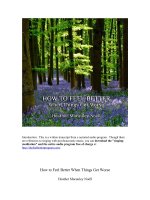Lecture Essay writing & presentation skills - Lecture 30: How to overcome nervousness when doing powerpoint presentation?
Bạn đang xem bản rút gọn của tài liệu. Xem và tải ngay bản đầy đủ của tài liệu tại đây (423.53 KB, 49 trang )
Lecture 30
How to Overcome
Nervousness When Doing
PowerPoint Presentation?
Summary
•
What are visual aids?
•
Why use visual aids?
•
Purpose of visual aids
•
10 Tips for Using Visual Aids
•
Contingency plans
•
Example: Designing and using Visual Aids
Introduction
•
POWERPOINT is widely used in our lives
like school works or business reports.
•
Making a PowerPoint slideshow not an
easy thing to do, but as compared to
presenting it in front of large audience, it is
nothing.
Introduction
•
Even the president, no matter how wellprepared he is, he will still be nervous.
•
Doing PowerPoint presentation should be
easier than directly public speaking, for
PowerPoint can help you to remember the
contents and it could switch people’s focus
•
Control Your Emotions:
The best speakers should learn to
control their emotions and no longer
feel awkward when hundreds of eyes
are
watching them.
•
Eye Contact:
Scientific study indicates that it is
true that the eyes could cause
pressure on you.
However, they have to manage to
overcome the nervousness, fear and
anxiety that public speaking used to
Do your knees feel like
Gumby's when you have to get
up and speak in front of a
group?
Do you feel like the next words
out of your mouth are going to
be the dumbest words ever
uttered by a human?
According to the book of Lists,
the fear of speaking in public is the #1 fear
of all fears. The fear of dying is #7!
•
Over 41% of people have some fear or
anxiety dealing with speaking in front of
groups. People who have this fear can
experience all kinds of symptoms:
–
Sweaty palms
–
Accelerated heart rate
–
memory loss and
–
even difficulty in breathing
Some
of
presenters
the
world's
have
freely
most
famous
admitted
to
nervousness and stage fright. Mark Twain
said it best:
"There are two types of
speakers: those that are nervous
and those that are liars".
How to Overcome
Nervousness?
Think of it as the 9 P's
Prior Proper Preparation
Prevents Poor Performance
of the
Person Putting on the
Presentation.
How to Overcome
Nervousness?
•
Know the room - become familiar with
the
place in which you will
speak.
–
Arrive early and walk around the room
including the speaking area.
–
Stand at the lectern, speak into the
microphone.
–
Walk around where the audience will be
seated.
–
Walk from where you will be seated to the
How to Overcome
Nervousness?
•
Know the Audience - If possible, greet
some
of the audience as they
arrive and chat with them.
It is easier to speak to a
of friends than to a
strangers.
group
group of
How to Overcome
Nervousness?
•
Know Your Material - If you are not
familiar
with your material or are
uncomfortable with it,
your nervousness will
increase.
Practice your speech or
presentation and revise it
you can present it
with ease.
until
How to Overcome
Nervousness?
•
Learn How to Relax - You can ease
tension by
doing exercises.
•
Sit comfortable with your back straight.
•
Breathe in slowly, hold your breath for 4 to 5
seconds, then slowly exhale.
•
To relax your facial muscles, open your mouth and
eyes wide, then close them tightly.
How to Overcome
Nervousness?
•
Visualize Yourself Speaking –
Imagine yourself walking confidently
to the lectern as the audience
applauds.
voice
Imagine yourself speaking,
loud, clear and assured.
When you visualize yourself as
successful, you will be successful.
your
How to Overcome
Nervousness?
•
Realize People Want You To Succeed –
•
All audiences want speakers to be:
•
•
Interesting
•
Stimulating
•
informative and
•
entertaining
They want you to succeed - not fail.
How to Overcome
Nervousness?
•
Don't apologize For Being Nervous –
•
•
•
•
Most of the time your nervousness does not show
at all.
If you don't say anything about it, nobody will
notice.
If you mention your nervousness or apologize for
any problems you think you have with your
speech, you'll only be calling attention to it.
Had you remained silent, your listeners may not
have noticed at all.
How to Overcome
Nervousness?
•
Concentrate on Your Message – not the
medium –
–
Your nervous feelings will dissipate if you
focus your attention away from your anxieties
and concentrate on your message and your
audience, not yourself.
How to Overcome
Nervousness?
•
Turn Nervousness into Positive Energy
–
–
the same nervous energy that causes stage
fright can be an asset to you.
–
Harness it, and transform it into vitality and
enthusiasm.
How to Overcome
Nervousness?
•
Gain Experience –
–
Experience builds confidence, which is the
key to effective speaking.
–
Most beginning speakers find their anxieties
decrease after each speech they give.
How to Overcome
Nervousness?
•
•
If the fear of public speaking causes you to
prepare more, then the fear of speaking
serves as it's own best antidote.
Remember, "He who fails to prepare is
preparing for failure - so Prepare,
Prepare, Prepare"
•
•
•
•
Fear of speaking in public
regularly comes high up in
surveys
of
human
fears!
Nerves? What Nerves?
Nervousness usually feels worse than it
looks (that's if people notice at all).
Your image of yourself may be worsened
by nerves, but it probably does not look
that way to others.
Your nervousness might not be as bad as
you think.
Change your Thinking
•
•
Live through your nerves, accept them,
know the signs of bad nerves, and change
your thinking about them. You need to put
something
between
the
nervous
symptoms and the negative thinking that
they can lead to - if you let them.
Try to focus on your material - not the
detail but the 'big picture' - or think
about something else entirely.
–
Try thinking about any everyday thing that is
It's not about You
•
Although your nerves may try to tell you
otherwise, the presentation is not really
about you. It is about the topic.
–
You need to focus the audience's attention on
the topic and not on you.
–
So begin with composing yourself so that you
can direct the audience's attention to your
material.
–
Audiences are supportive of people who are
nervous. The audience is not your enemy.









